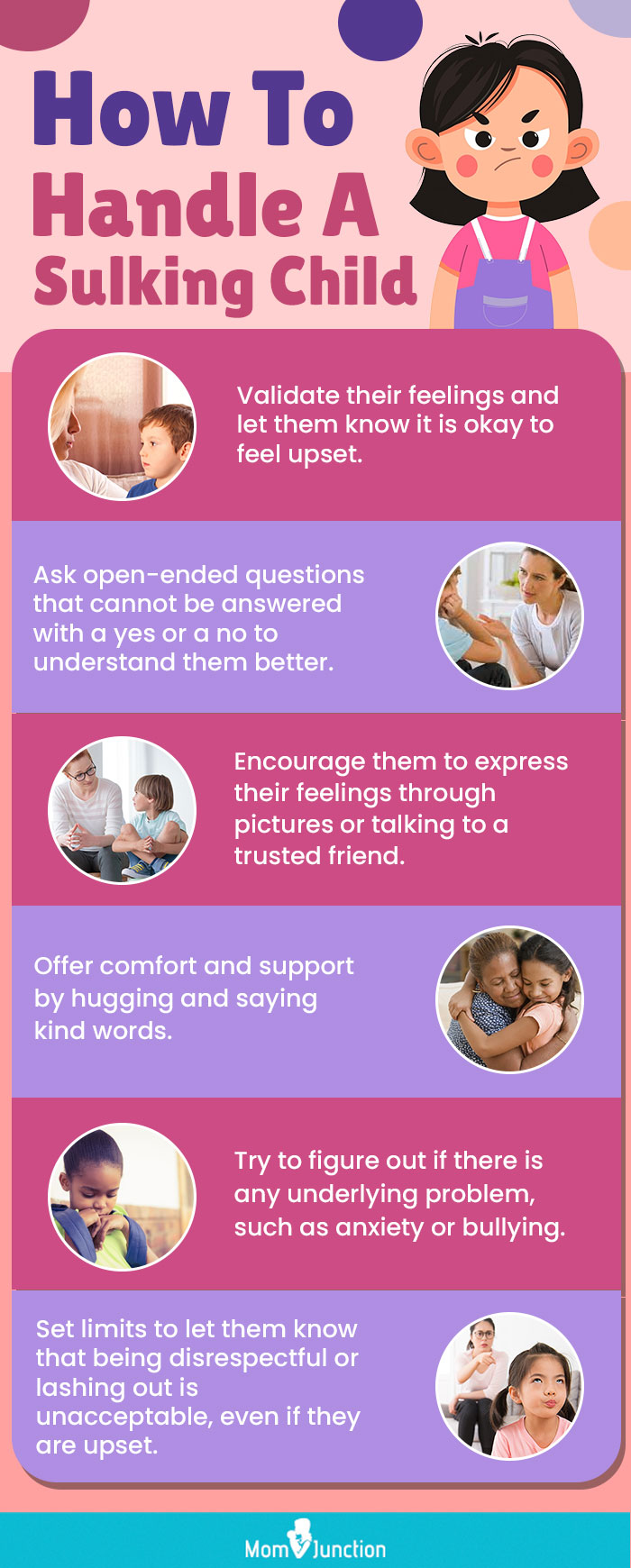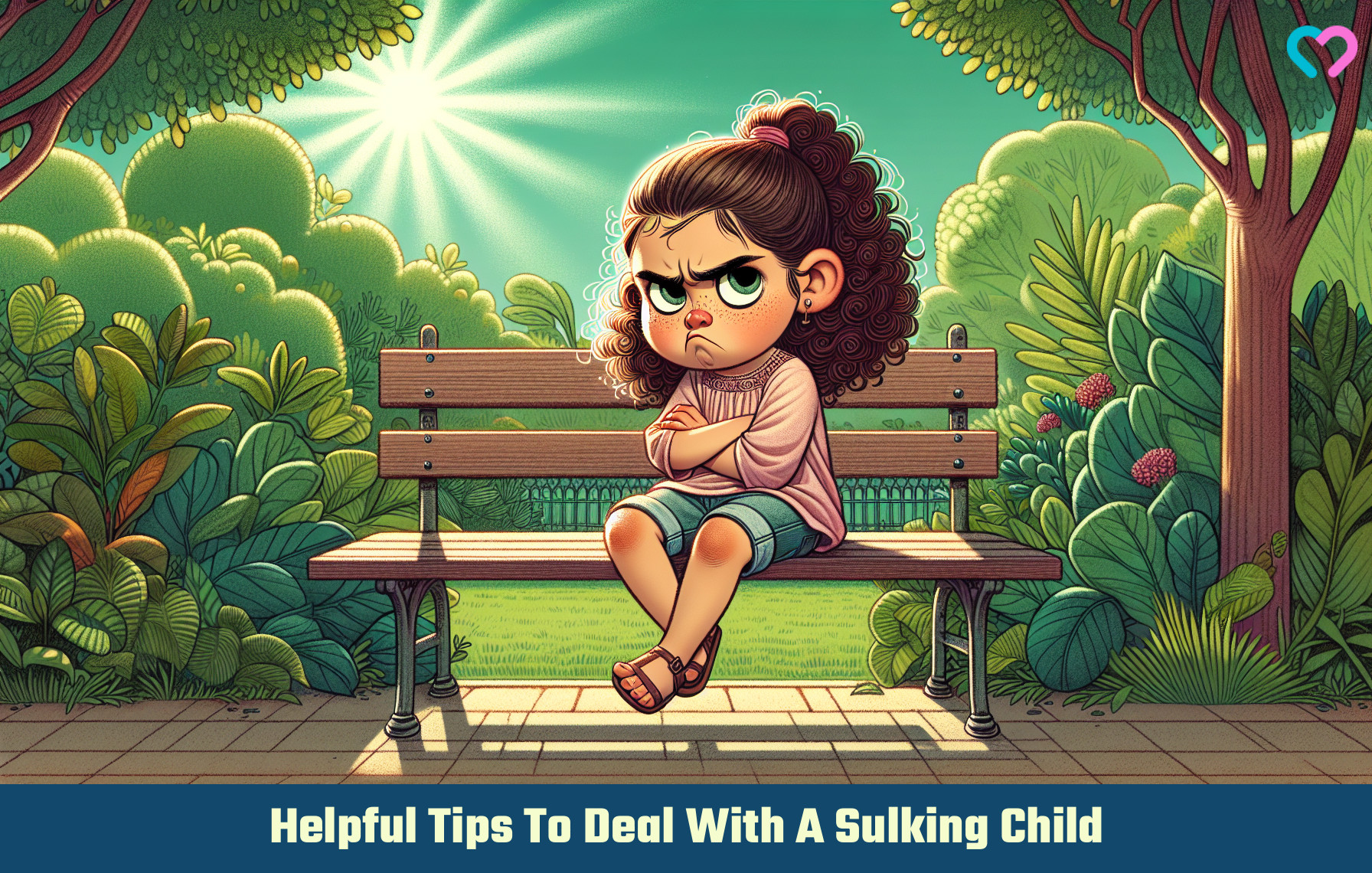
Image: ShutterStock
Many parents observe changes in their child’s behavior with age. For example, some children tend to be moody and display difficult, sulky behaviors as they grow older, leaving the parents wondering how they can deal with their sulking child.
Usually, children may express that they are upset, discontented or dissatisfied by sulking, glaring with anger, and groaning. However, parents may find it challenging to cope with their children’s constant tantrums and arrogant behaviors.
Implementing some easy yet effective parenting tricks could help comprehend the problems your child could be experiencing. Want to know some ways to help your child be peaceful and relaxed and prevent them from constantly sulking? Read ahead to explore some useful tips on dealing with a sulky child.
Here is our list of some simple parenting tips to help you deal with your sulking child:
9 Helpful Tips To Deal With A Sulking Child
1. Spend quality time in nurturing your child
Image: Shutterstock
Parental attention provides care and stabilizes your child. So make sure your spouse and you spend enough time nurturing your kid. Spending time with parents makes children happy, helps them be open about their problems, and prevents them from sulking (1).
2. Maintain welcoming, safe, and pleasant atmosphere at home
Note that home is a place where children can express themselves freely and safely. So make efforts to create and maintain a welcoming, safe, and pleasant atmosphere at home. Give your pouting child attention, avoid arguments with family members, and try to please your child when you find them disgruntled or in a sullen or sulky mood. Your child will then find a home, a safe place to open up about their problems (2).
 Do remember
Do remember3. Encourage your child to express them verbally
Image: Shutterstock
When you notice your child pouting or glum, bring this to their attention and encourage them to express their problems in words. Assure your child that you won’t respond to their problem negatively. Communicate with your child effectively (3).
4. Encourage your child to maintain a diary
Image: IStock
Often, children who find it difficult to communicate their problems feel better when they pen them down. So encourage your sulking or brooding kid to maintain a diary as it will help them overcome the stress (4).
5. Avoid overreacting
When your child sulks and becomes cranky and irritable, avoid overreacting and displaying harsh behavior towards them. If you find he is petulant for no reason, ignore them and let them realize you won’t entertain their unreasonable mood swings (5).
 Did you know?
Did you know?6. Try to keep stress at a minimum
Image: Shutterstock
Make sure your child doesn’t suffer from any stress. Avoid high expectations that are inappropriate and do not subject your child to study for long hours. Encourage your child to develop a good balance between their studying and playing hours. Also, avoid displaying your anger as it may make them anxious (6). Try not to compare your child to other children of their age academically.
Bikendra Thapa, a blogger, highlights that children can face emotional struggles even in non-traumatic situations, and parents can employ a simple strategy to help them cope. He shares, “My daughter experienced pressure to perform well in a running competition at school a few weeks ago. She was worried she wouldn’t win the race. Then, to distract our daughter’s mind from the next day’s event, my wife asked her to draw anything she wanted.
“My daughter spent the next 15 minutes creating her artwork. She drew a flower and a bee. I asked her why she chose to draw this. ‘I was thinking about spring’, she said in response. We commended her for her creativity and effort. She felt happy and started playing with her toys. It felt like she had stopped thinking about the big event. She had a good night’s sleep. The following day, she ran well (i).”
7. Ensure your child gets appropriate nutrition
Image: IStock
Kids with nutritional deficiency often experience mood swings. So make sure you provide proper nutrition to your dear little one. Plan a balanced, nutritious diet for your child and make sure their diet contains all nutrients necessary to maintain good physical as well as psychological health. If your child suffers from any nutritional deficiency, consult your doctor and make the changes in your child’s diet. Studies reveal that B vitamins and fatty acids are highly beneficial for sulking children. If the child suffers from vitamin B deficiency, it affects the kid’s mood adversely. You can also give them B-complex supplements at the doctor’s guidance (7).
8. Pay no attention
If your child starts crying, stomping feet, or throwing a tantrum, refrain from giving attention. Although ignoring tantrums may escalate the behavior at first, eventually, your child will change the behavior when they realize that you don’t pay attention. Avoid offering comfort or engaging in conversation when they are frustrated. When they calm down, provide positive attention to reinforce appropriate behavior.
9. Visual cues
For younger, moody kids, visual cues can be effective. For this, grab their attention by mirroring their pouting expression and use your fingers to transform it into a smile. They might do the same and be pleasant again. While it may not work every time, it’s worth a try to positively influence their mood.
 Be watchful
Be watchfulFrequently Asked Questions
1. Why do children sulk?
Children who are not yet verbally well-equipped to communicate their wants, dislikes, and frustrations may resort to sulking.
2. Do all children sulk?
All children may not be sulkers, but it is common for them to sulk when unhappy. Parents must not give in to this behavior but work on their areas of improvement so that children learn to express themselves better.
3. When do children stop sulking?
No fixed age has been identified for when children stop sulking; for some, it may extend to teenage as well. Once they learn to convey their emotions, they may stop their sulking behavior.
4. Can sulking be an attention-seeking behavior?
Sulking may be a way for children to seek attention when they feel left out. If they believe they are not receiving enough time or attention from their parents, they may exhibit whiny behavior and act or throw tantrums to be noticed. Although dealing with this behavior might be challenging, giving them the love and encouragement they need is crucial. Make an effort to spend time with them each day and let them know they can count on you.
As children grow, their behaviors and habits may change. Sometimes, children get into the habit of sulking. Sulking may often show that the child is upset over something. Although this is a natural behavior, parenting a sulking child may be overwhelming at times. However, losing patience or getting angry might not be of any help. Instead, spend quality time with your child and understand their needs. Create a safe and loving environment at home where they feel comfortable expressing themself. If you cannot understand your child’s emotions, encourage them to express their feelings verbally. Following these steps will help create a happy environment at home where your child will have fewer reasons to sulk.
Infographic: Tips To Deal With A Sulking Child
A child may sulk for various reasons, such as feeling misunderstood or being upset about something. It is important for parents to understand the cause of their child’s sulking and to respond in a way that helps the child feel supported. This infographic provides tips on dealing with a sulking child and helping them through difficult emotions. Illustration: Momjunction Design Team
Key Pointers
- Parents can find it difficult to handle persistent tantrums and arrogant attitudes of their children.
- Effective strategies to cope with a sulking child include spending quality time with them, creating a safe and happy home environment, and encouraging them to communicate their difficulties.
- Parents should avoid setting high expectations, displaying harsh conduct, or showing extreme agitation towards their child.
- It is important to encourage children to strike a healthy balance between learning and playing time, and ensure they get adequate nutrition.
Image: Dall·E/MomJunction Design Team
Personal Experience: Source
MomJunction articles include first-hand experiences to provide you with better insights through real-life narratives. Here are the sources of personal accounts referenced in this article.
i. Dealing with a sulking child? Use the power of art;https://medium.com/new-writers-welcome/dealing-with-a-sulking-child-use-the-power-of-art-4675085000ec























